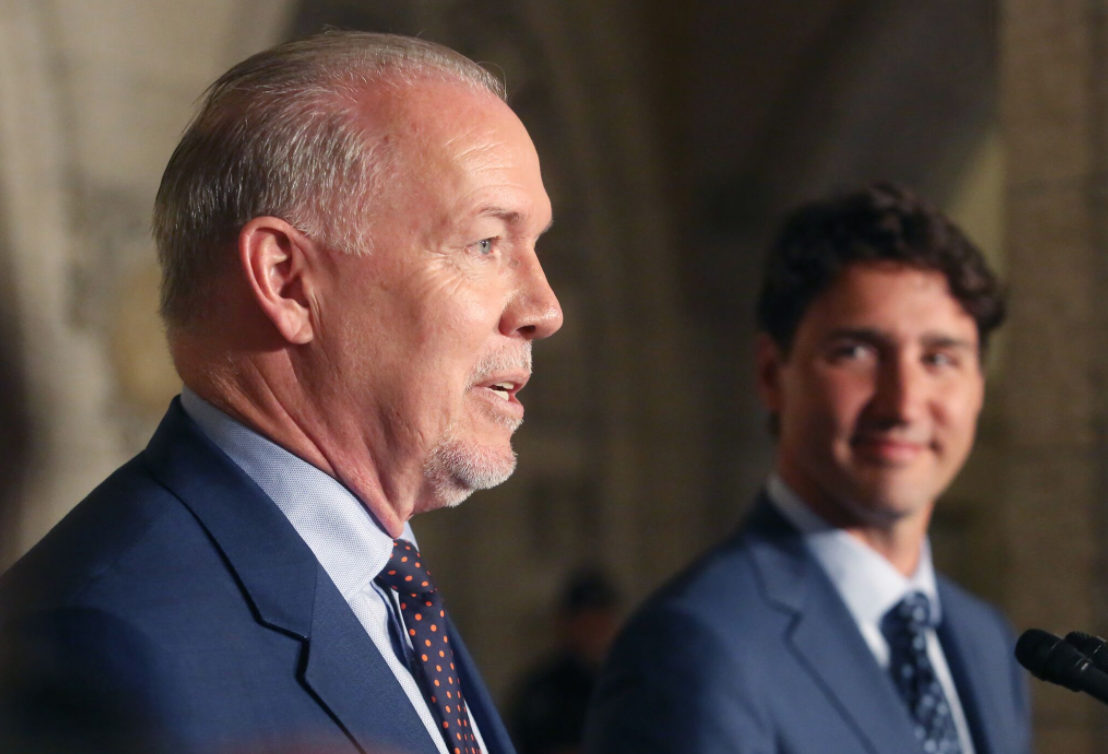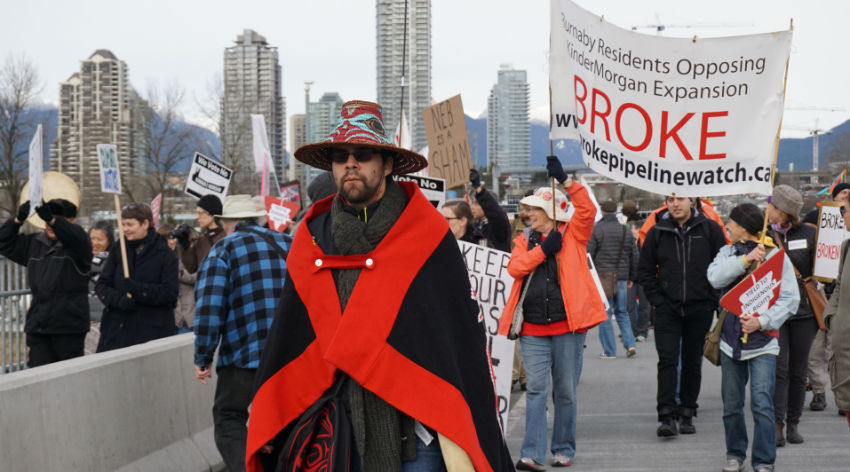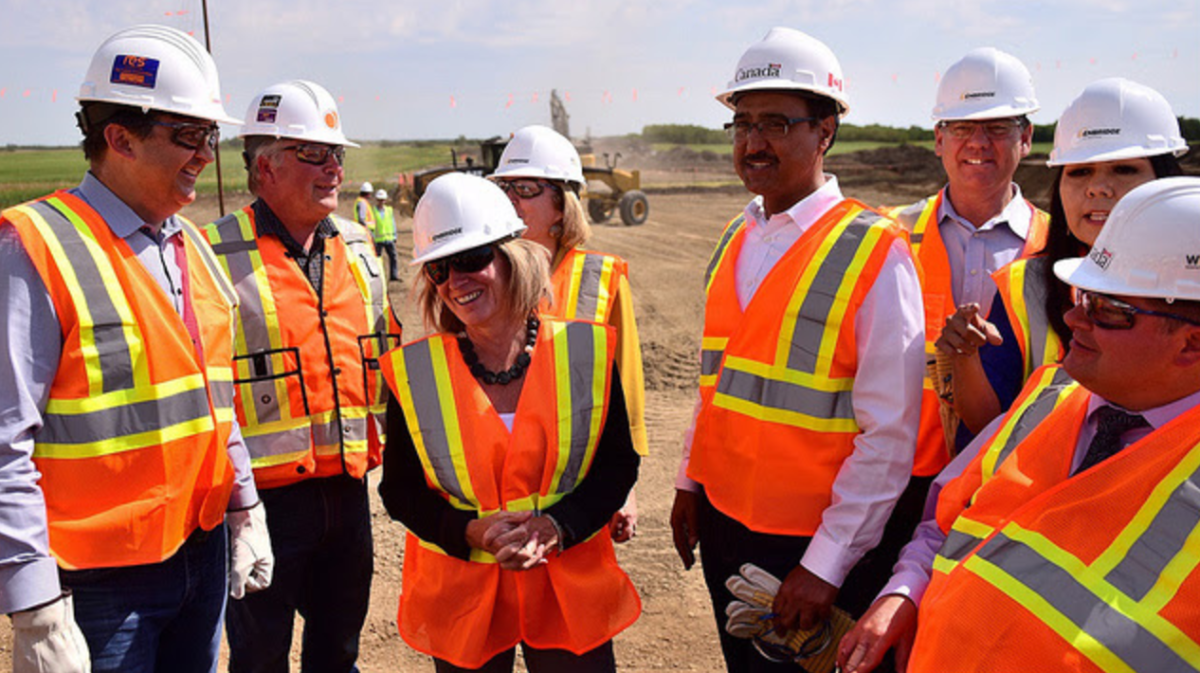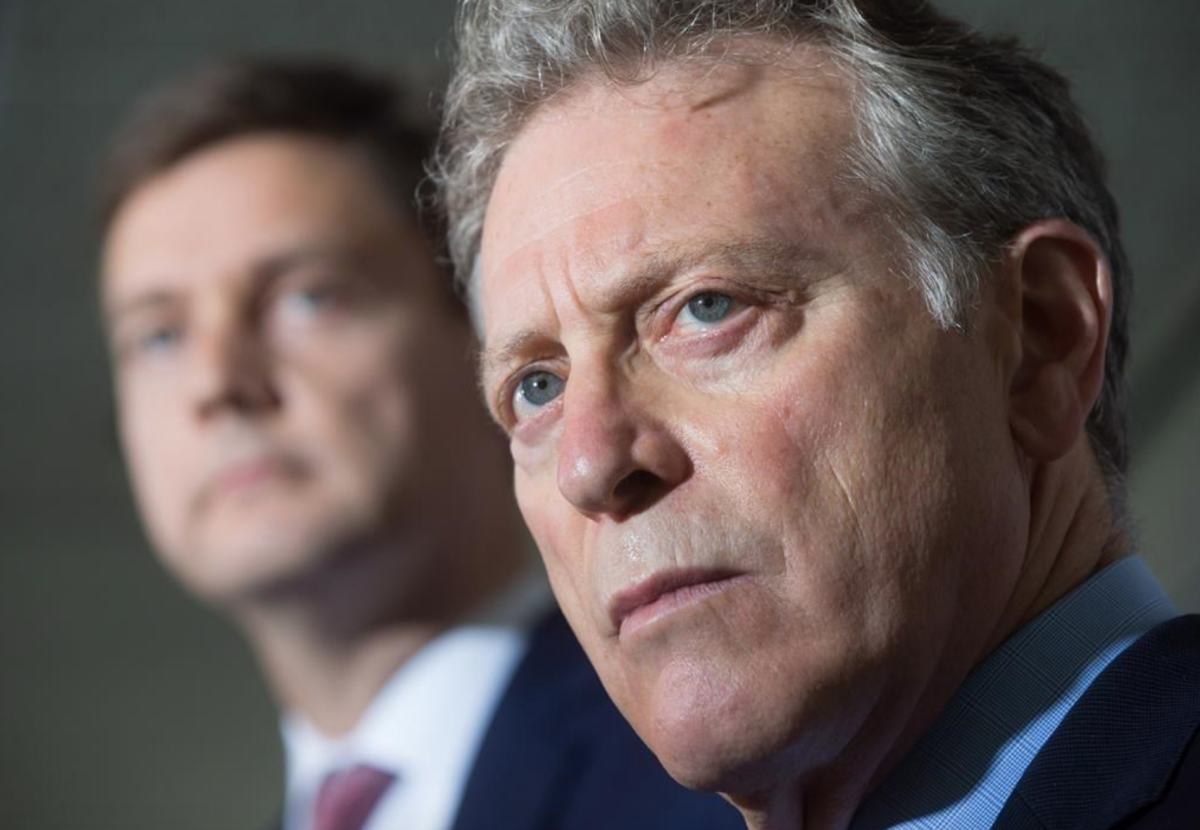Support strong Canadian climate journalism for 2025
British Columbia's new government has taken its first steps to stop Kinder Morgan's pipeline expansion project to the west coast.
Environment Minister George Heyman announced on Thursday that the NDP government has hired a new legal advisor to help deliver on its promise to use "every tool available" to stop the oilsands expansion project, and to assist in seeking intervenor status in challenges to the federal government's approval of the Alberta-to-B.C. pipeline.
It's the first action of many, Heyman promised, indicating that in the months to come, his ministry will continue to review other measures it can take to stop the Texas-based company from completing the project.
In a statement released shortly after the announcement, Trans Mountain said that the company is taking the province's announcement "seriously" and will be reviewing it more closely.
“We are committed to working with the province and permitting authorities in our ongoing process of seeking and obtaining necessary permits and permissions,” said Kinder Morgan Canada president Ian Anderson. “We have undertaken thorough, extensive and meaningful consultations with Aboriginal Peoples, communities and individuals and remain dedicated to those efforts and relationships as we move forward with construction activities in September."
The Trans Mountain expansion was approved by Prime Minister Justin Trudeau's federal government last November. It was later backed by the previous BC Liberal government which had granted the required provincial certificates.
But Premier John Horgan's NDP defeated the minority BC Liberal government in the provincial legislature in June following the May election after reaching a governance agreement with the BC Green Party that included taking action to block the controversial pipeline.
"Our government made it clear that a seven-fold increase in heavy oil tankers in the Vancouver harbour is not in B.C.'s best interests," Heyman told reporters during a press conference in Vancouver. "Not for our economy, our environment, or thousands of existing jobs. We will use all available tools to protect our coastal waters and our province's future."

Province to appear in federal court
The Kinder Morgan Trans Mountain expansion is a $7.8-billion proposal to add 980 kilometres of brand new pipeline to an existing system that transports more than 300,000 barrels of oil per day from Alberta to the B.C. coast. If constructed, the expansion would triple that system's capacity to 890,000 barrels of oil per day, and send local tanker traffic soaring as it ships the oil to market.
Industry stakeholders say the project is needed to protect jobs in Canada's slumping fossil fuel sector by helping oil companies reach new markets in Asia. At the same time, the pipeline has triggered massive protests in B.C. More than 20 municipalities and 17 First Nations have formally opposed the project, citing unacceptable risks to sensitive land and water ecosystems, violation of Indigenous sovereignty, and greenhouse gas emissions that would push climate targets further from reach.
The province's new external counsel — Thomas Berger — will help the B.C. government seek intervenor status in a judicial review of the project slated to take place in federal courts in November. Twenty-one parties have challenged the National Energy Board's (NEB) review and recommendation of the project, explained B.C. Attorney General David Eby, and Berger will help the province form legal arguments.
Berger is a former Supreme Court Justice in B.C., a former leader of the BC NDP Party, and served as the Royal Commissioner of the 1974 Mackenzie Pipeline Inquiry investigating the proposed project's environmental, social and economic impact. He will also lead the government's action as a respondent in the Squamish First Nation's court case citing inadequate consultation on the project.
"(Berger) is a living example of modern First Nations law in Canada and we think his presence on this file will signal a couple of things," said Eby, standing side by side with Heyman.
"One is our commitment to First Nations in British Columbia both in this specific litigation, but generally with respect to the UN Declaration of the Rights of Indigenous Peoples, and the Truth and Reconciliation Commission recommendations that there is a new government; second is to ensure that in this court matter, in the Squamish court matter, that the interests of the province, including our government-to-government relation with First Nations are protected."
Construction on hold pending plans
As it stands, Kinder Morgan cannot proceed with its construction plans on public land next month, said Heyman. The company has not yet fulfilled all the conditions of its provincial environmental assessment certificate, which include additional consultation from First Nations and completion of environmental management plans for grizzly bears, and vegetation and weed management.
Eight such plans were required by the province, said Heyman, three of which have been completed and five of which have been rejected for failing the environmental assessment office's test of "adequate consultation with First Nations."
Meantime, the company may proceed with construction on private land, including portions of Burnaby Mountain, its tank farm, and the Westridge Marine Terminal in Burnaby, B.C. where it has plans to upgrade and expand in order to handling an increased load of incoming crude oil.
"That is outside the scope of our review," said Heyman. "Until those (environmental management plans) are completed, Kinder Morgan — with the exception of private land and some clearing of right-of-way — cannot put shovels in the ground. They need to have those work plans accepted."
It's highly unlikely, he added, that such plans could be completed and approved by Sept. 12. If Kinder Morgan starts work on public or First Nations land before the plans are approved, the company would be in violation of its provincial environmental stamp of approval.

What about the jobs?
Supporters of the Trans Mountain project argue that it will bring much-needed jobs to B.C. and Alberta, and that the risk and impacts of an oil spill can be mitigated with land and water safety plans required by the provincial and federal governments.
On Thursday, Kinder Morgan Canada said the expansion project has undergone "an unprecedented level of scrutiny and review," and is subject to more than 150 environmental, financial, and technical conditions imposed on it by the federal government, and another 37 conditions attached to the B.C. government's environmental certificate. The company maintains that the project will contribute $46.7 billion in taxes and royalties to government coffers over 20 years, and create 15,000 construction jobs per year during peak construction, and 37,000 direct, indirect and induced jobs per year of operation.
Asked what would happen to those jobs if the project fell flat as a result of provincial action, Heyman said the B.C. government has plans to provide other employment options. The province's economy, he explained, simply can't afford the economic risk posed by an oil spill.
"This government has many plans for capital infrastructure, plans that we will proceed with over the coming months and years that will provide many good jobs," he said. "There are thousands — thousands — of jobs in the marine harvest industries as well as in the tourist industry, in coastal B.C., the Lower Mainland and Vancouver Island that are threatened by an oil spill...Our job is to defend B.C.’s economic interests."
The B.C. government's position on the pipeline and its impact on employment is at odds with the neighbouring NDP government of Alberta Premier Rachel Notley. Notley has vehemently supported the Trans Mountain expansion, and on Thursday, touted the benefits of another recently-approved pipeline expansion project — Enbridge's Line 3 pipeline.
The Enbridge and Kinder Morgan projects were approved by the Trudeau government together on Nov. 29, 2016. Upon completion, Line 3 would expand the amount of oilsands oil, or bitumen, shipped to a terminal in the United States.
Calgary-based Enbridge describes it as the largest pipeline expansion project in its history.
“Line 3 is about good jobs, growing Alberta’s – and Canada’s – economy and ensuring we have safe, modern infrastructure to transport our energy resources to market while protecting the environment,” Notley told reporters in Hardisty, Alta. on Thursday as she toured the Line 3 construction site.
Standing next to federal ministers from Calgary and Edmonton, Kent Hehr and Amarjeet Sohi, she called it an "exciting day for Albertans and all Canadians."
In a statement issued by the provincial government, Notley explicitly thanked the pipeline company Enbridge and the federal government, “for all the work that has brought us to this momentous day." She also expressed pride that the oil soon to flow from Line 3 will come from "the most responsible, forward-looking energy jurisdiction in North America – and arguably the world."

Environmental advocates delighted
In B.C., environmental advocates, including BC Green Party leader Andrew Weaver, were delighted with their own provincial government's pipeline opposition.
Cam Fenton of 350.org said "Justin Trudeau should start taking notes" on the Horgan government's climate and Indigenous leadership. Weaver, who helped BC NDP Premier John Horgan secure his minority government, called it a demonstration that his counterpart intends to make good on his promise to do everything possible to stop the pipeline.
"Government has a responsibility to base major decisions affecting the lives and livelihood of so many people on sound evidence, and in the case of Trans Mountain that standard was not met," Weaver explained in a Thursday press statement. "In the B.C. Green caucus’ view, the National Energy Board process that led to this project’s approval was profoundly flawed...To cite one example, the entire marine spill response was predicated on the existence of 20 hours of sunlight. There is no place south of Tuktoyaktuk that has that much sunlight on any day of the year."
Sven Biggs, an energy and climate campaigner for Stand.earth, applauded the "high bar of provincial conditions" required for the project to proceed.
“By basing this decision on Kinder Morgan’s failure to meet conditions related to First Nations consultation, the Provincial Government is sending a strong message that corporations seeking to build these projects need the consent of First Nations before they proceed,” he said a statement.
“With two thirds of the First Nations impacted by this pipeline withholding their consent, Kinder Morgan still has a lot of work to do..."
Editor's Note: This story was updated at 4:15 p.m. Eastern Time to include comments from Kinder Morgan Canada.






Comments
If there is any prayer that should be answered, this is near the top of the list.
Amen.
I have heard that BC intends to adopt UNDRIP, the United Nations declaration of the rights of indigenous people. This is a great government supported by moral, legal and constitutional premises. And Kinder Morgan is acting like the schoolyard bully who's been told to bugger off but just keeps on bullying.